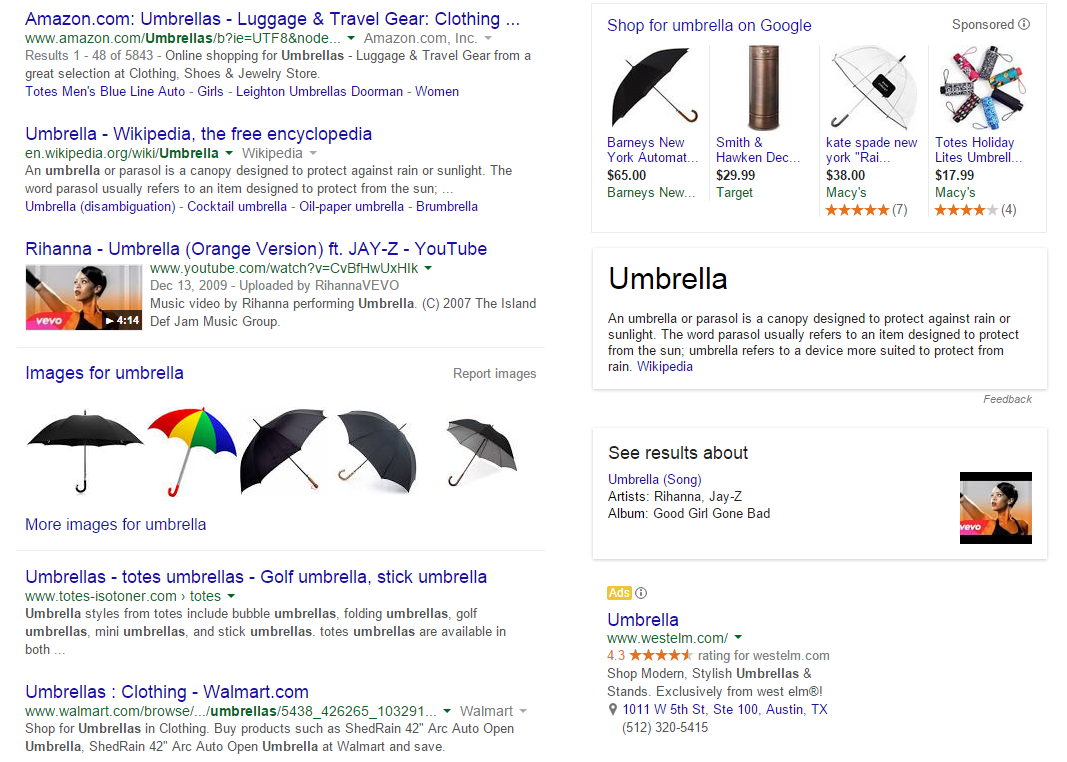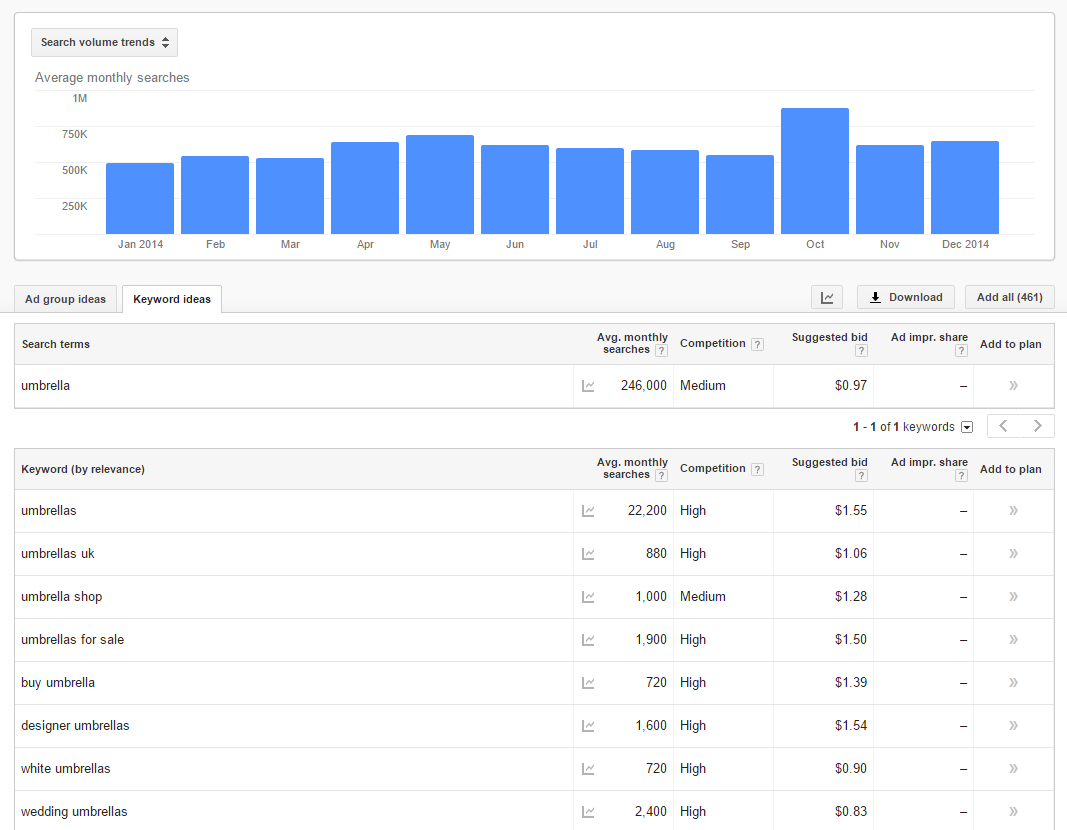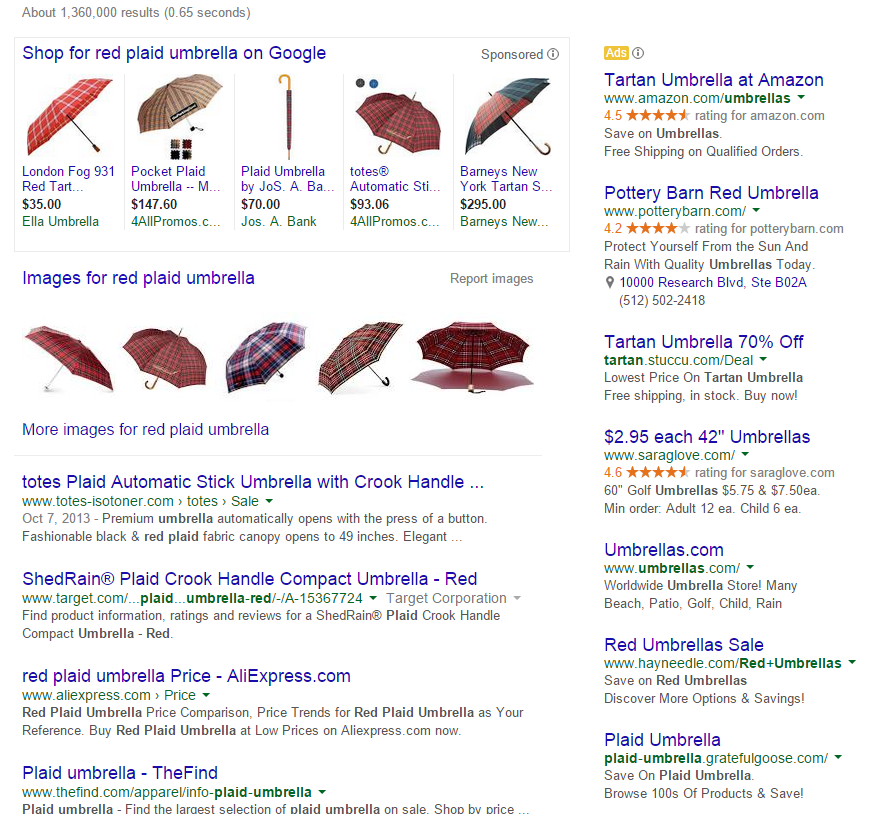Three Easy Steps to Great PPC Keywords
Choosing the right PPC keywords is an important part of creating a paid search campaign. Keyword searching can seem like a mammoth task, but if you approach it in small steps, it’s more manageable than it first appears.
Step 1: Understand What Your Keywords Are
A keyword is a word or phrase entered into a search engine in order to get the search engine to return matching and relevant results. It’s what you enter into Google when you want to find a “coupon for Outback” before you have dinner there tonight or find a cool new umbrella:
When Google comes back with your results, you will receive a combination of organic results and images and ones identified as “Ads,” that are part of paid search campaigns for those keywords.
Step 2: Brainstorm Keywords That Customers May Use
No one knows more about your business and products than you do, right? That’s great, but now you need to put yourself in the mind of your customer. Start by brainstorming possible keywords. Let’s say that you sell umbrellas. Here are some things to consider as you generate keyword possibilities:
- How Others Describe Your Products or Company: When you’ve spoken with customers, do they describe your company as the one that sells designer umbrellas? The company with umbrellas in every color of the rainbow? Or maybe really big umbrellas made in the US? Or all of the above? You may want to consider variations of a single type or all those terms.
- What Makes Your Company or Products Unique: Do you sell the only kids umbrellas in a Batman pattern? Or maybe the only personalized umbrellas? These terms not only help you motivate people looking for these specific items, but the keywords will probably have fewer competitors and thus be more cost effective.
- Top Products: If your best seller is a red-and-black plaid umbrella, then consider a keyword that incorporates some or all of that language. While competition may be fierce, and the term may be higher-priced, but you may be more likely to get a sale on those clicks.
- Competitor Keywords: Check out what your competitors use for keywords. You might be able to modify similar keywords to make them work for your products.
- Keyword Search Tools: There are many free keyword search tools, where you can just enter a keyword and they provide variations. Google has one if you already have an AdWords account, and Wordstream also has a good one in their free trial of their software.
Step 3: Learn the Three Types of Keywords: Exact Match, Phrase Match and Broad Match
Before you start narrowing down keywords and creating ads, you’ll need to understand the three types of keywords in Google Ads. Choosing different keyword types will result in changes in the cost of your ads and click through rate:
- Exact match: If you choose “red plaid umbrella” as an “exact match” keyword, then only someone who searches for “red plaid umbrella,” the exact keyword with the words in that exact order, would see it.
- Phrase match: Choosing the “phrase match” keyword type will display your ad if the search term contains the same order of the words, but it can also contain additional words. For example, if someone types in “red and green plaid umbrella” and if your keyword is “red plaid umbrella,” your ad will appear.
- Broad match: This is the catch-all keyword type. A keyword set to “broad match,” will display your ad when the search term contains any or some combination of the words in your keyword in any order, as well as other variations of the words, such as singular/plural forms, synonyms, etc. If you used the broad match keyword type for “red plaid umbrella,” your ad could come up in searches for “plaid umbrella,” “red umbrella,” “parasol,” etc.
As you can see from the Google search below, most ads that show up with a search for “red plaid umbrella” come up as a broad match, with terms including “plaid umbrella” and “red umbrella.”
As you might expect, broad match keywords might get you more clicks, but are more competitive and get less targeted traffic. Exact match and phrase match will cost less, and get you more focused traffic, but may lead to missed opportunities.
Next Steps
Now that you have your list of possible keywords, and understand the different types of keywords, you’ll need to narrow them down in preparation for creating a paid search ad. In upcoming articles, we’ll help you understand how to narrow down your keywords, to determine which ones to use for your paid search campaign, as well as how to create a successful paid search ad.








